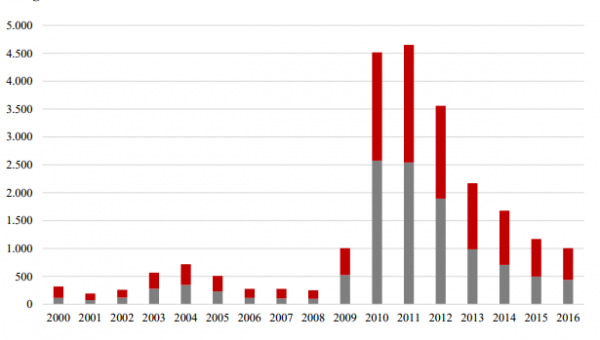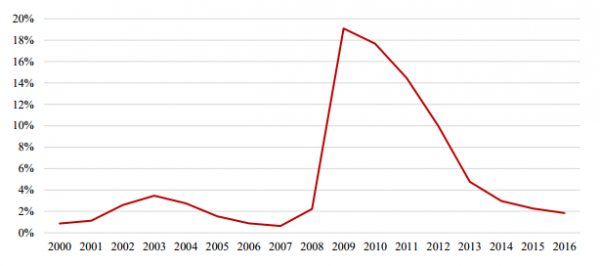Due to low unemployment and extremely robust job creation Icelandic employers have been hiring record numbers of foreign workers in recent years. As a result foreign nationals and immigrants now make up a larger share of the workforce than at any time, the Icelandic Federation of Labor ASÍ finds. At present foreign workers make up 12-13% of the Icelandic workforce.
Too many jobs, too few workers
A new report from ASÍ argues that the Icelandic labor market is currently operating at full capacity. Labor participation in Iceland is the highest in the OECD and unemployment is at a record low. Figures from the OECD show that Icelanders work longer hours than most other developed nations. Icelandic workers worked on average 1,883 hours each year, compared to the OECD average of 1,763 and the Americans average of 1,783 hours each year.

Problems associated with unemployment, including long-term unemployment and youth unemployment have historically been negligible in Iceland. While long-term unemployment has increased since pre-crash, it has dropped rapidly since 2011. Fewer than 1000 people have been without work for more than 12 months. Low long-term unemployment is a sign that the labor market is operating smoothly.
Read more: Shared prosperity: Wages in Iceland increased by 7.3% over past 12 months
Low unemployment and high labor participation means that companies find it difficult to hire local workers to fill vacancies. The long hours worked mean that workers are already working long hours or second jobs. Vacancies cannot therefore be filled by part time workers.
Tourism a major factor
The most important reason for the increase in the number of foreign workers is tourism. The rapid growth of the tourism industry in recent years has not only increased the need for workers in the tourism, hotel and service industries, but also in construction.
While many foreign workers are here to stay, having moved to Iceland with their families, many are temporary workers who are in Iceland for a short time to earn money. These workers have come to Iceland through local or foreign employment agencies.
Growing fears foreign workers are shortchanged

The report argues that the growing importance of employment agencies makes it harder for both the authorities and unions to monitor the labor market to ensure that workers are being paid contract wages and that all laws and labor contracts are being honored.
The Federation of Labor has seen numerous cases where employers are abusing foreign employees who are not familiar with their rights.
Growing labor radicalism
Today the members of the largest union in Iceland, Efling, the union of manual and unskilled laborers, vote for a new Union Board. Efling is the largest union of foreign workers in Iceland: Nearly half of the members of Efling are foreign nationals.
A Socialist labor organizer and activist, Sólveig Anna Jónsdóttir, has challenged the candidate of the union leadership, criticizing it for failing to represent the lowest paid workers and the foreign members. Sólveig's slate of candidates for the Union Board includes three immigrants. If Sólveig wins the elections it would be the first time in Icelandic history that foreign workers are represented on the board of a major union.
Due to low unemployment and extremely robust job creation Icelandic employers have been hiring record numbers of foreign workers in recent years. As a result foreign nationals and immigrants now make up a larger share of the workforce than at any time, the Icelandic Federation of Labor ASÍ finds. At present foreign workers make up 12-13% of the Icelandic workforce.
Too many jobs, too few workers
A new report from ASÍ argues that the Icelandic labor market is currently operating at full capacity. Labor participation in Iceland is the highest in the OECD and unemployment is at a record low. Figures from the OECD show that Icelanders work longer hours than most other developed nations. Icelandic workers worked on average 1,883 hours each year, compared to the OECD average of 1,763 and the Americans average of 1,783 hours each year.

Problems associated with unemployment, including long-term unemployment and youth unemployment have historically been negligible in Iceland. While long-term unemployment has increased since pre-crash, it has dropped rapidly since 2011. Fewer than 1000 people have been without work for more than 12 months. Low long-term unemployment is a sign that the labor market is operating smoothly.
Read more: Shared prosperity: Wages in Iceland increased by 7.3% over past 12 months
Low unemployment and high labor participation means that companies find it difficult to hire local workers to fill vacancies. The long hours worked mean that workers are already working long hours or second jobs. Vacancies cannot therefore be filled by part time workers.
Tourism a major factor
The most important reason for the increase in the number of foreign workers is tourism. The rapid growth of the tourism industry in recent years has not only increased the need for workers in the tourism, hotel and service industries, but also in construction.
While many foreign workers are here to stay, having moved to Iceland with their families, many are temporary workers who are in Iceland for a short time to earn money. These workers have come to Iceland through local or foreign employment agencies.
Growing fears foreign workers are shortchanged

The report argues that the growing importance of employment agencies makes it harder for both the authorities and unions to monitor the labor market to ensure that workers are being paid contract wages and that all laws and labor contracts are being honored.
The Federation of Labor has seen numerous cases where employers are abusing foreign employees who are not familiar with their rights.
Growing labor radicalism
Today the members of the largest union in Iceland, Efling, the union of manual and unskilled laborers, vote for a new Union Board. Efling is the largest union of foreign workers in Iceland: Nearly half of the members of Efling are foreign nationals.
A Socialist labor organizer and activist, Sólveig Anna Jónsdóttir, has challenged the candidate of the union leadership, criticizing it for failing to represent the lowest paid workers and the foreign members. Sólveig's slate of candidates for the Union Board includes three immigrants. If Sólveig wins the elections it would be the first time in Icelandic history that foreign workers are represented on the board of a major union.






